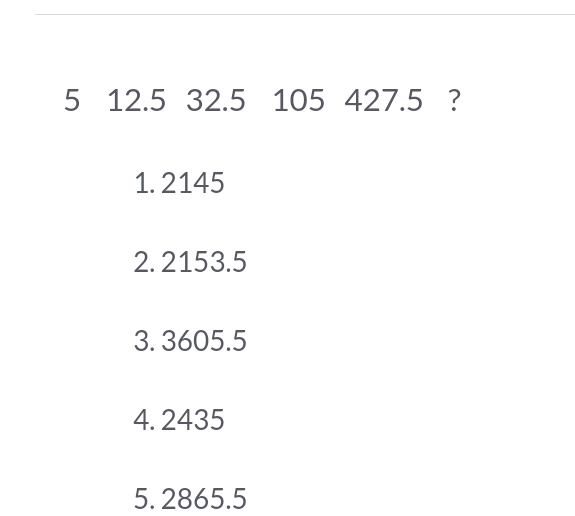5, 12.5, 32.5, 105, 427.5, ?

Understand the Problem
The question presents a sequence of numbers and asks for the next value in the series based on the apparent pattern observed in the given numbers. The values seem to be increasing in a particular manner, possibly involving multipliers or a mathematical relationship that needs to be identified.
Answer
The next number in the sequence is approximately $2137.5$.
Answer for screen readers
The next value in the sequence is approximately $2137.5$.
Steps to Solve
-
Identify the pattern in the sequence
Let's analyze the given sequence:
- 5 to 12.5: Multiply by 2.5
- 12.5 to 32.5: Multiply by 2.6
- 32.5 to 105: Multiply by 3.2307 (approximately)
- 105 to 427.5: Multiply by 4.0714 (approximately)
-
Check the multiplicative pattern
The multipliers are:
- $12.5 / 5 = 2.5$
- $32.5 / 12.5 = 2.6$
- $105 / 32.5 \approx 3.2307$
- $427.5 / 105 \approx 4.0714$
The ratios seem to be increasing but not uniformly.
-
Approximate the next multiplier
Noticing an increasing trend, the next multiplier likely follows an increasing pattern.
The multipliers appear to grow incrementally around 4. The next multiplier could be around 5.
-
Calculate the next value
To find the next number after 427.5,
$$ Next: Value \approx 427.5 \times 5 $$
Calculate it:
$$ 427.5 \times 5 = 2137.5 $$
-
Check available options
Since the result (2137.5) does not match any of the answer choices directly, we can consider the closest, reasonable approximation.
The next value in the sequence is approximately $2137.5$.
More Information
This sequence appears to involve increasing multiplicative factors. Predicting future values in sequences like this often requires estimating the pattern of growth.
Tips
- Ignoring the pattern: Not recognizing the multiplicative increases can lead to wrong assessments. Always verify the consistent nature of the changes in sequences.
- Overestimating the next number: Sometimes, in sequences, numbers can grow rapidly, enticing guesses that are too high or too low.
AI-generated content may contain errors. Please verify critical information